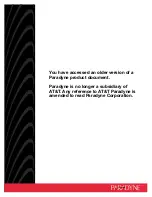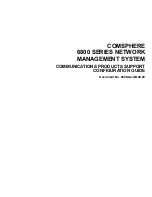
Contents
xxvii
Cisco IE 3000 Switch Software Configuration Guide
OL-13018-03
Enabling DSCP Transparency Mode
36-36
Configuring the DSCP Trust State on a Port Bordering Another QoS Domain
36-37
Configuring a QoS Policy
36-39
Classifying Traffic by Using ACLs
36-39
Classifying Traffic by Using Class Maps
36-42
Classifying, Policing, and Marking Traffic on Physical Ports by Using Policy Maps
36-44
Classifying, Policing, and Marking Traffic by Using Aggregate Policers
36-48
Configuring DSCP Maps
36-50
Configuring the CoS-to-DSCP Map
36-51
Configuring the IP-Precedence-to-DSCP Map
36-52
Configuring the Policed-DSCP Map
36-53
Configuring the DSCP-to-CoS Map
36-54
Configuring the DSCP-to-DSCP-Mutation Map
36-55
Configuring Ingress Queue Characteristics
36-56
Mapping DSCP or CoS Values to an Ingress Queue and Setting WTD Thresholds
36-57
Allocating Buffer Space Between the Ingress Queues
36-58
Allocating Bandwidth Between the Ingress Queues
36-59
Configuring the Ingress Priority Queue
36-60
Configuring Egress Queue Characteristics
36-61
Configuration Guidelines
36-61
Allocating Buffer Space to and Setting WTD Thresholds for an Egress Queue-Set
36-61
Mapping DSCP or CoS Values to an Egress Queue and to a Threshold ID
36-64
Configuring SRR Shaped Weights on Egress Queues
36-65
Configuring SRR Shared Weights on Egress Queues
36-66
Configuring the Egress Expedite Queue
36-67
Limiting the Bandwidth on an Egress Interface
36-67
Displaying Standard QoS Information
36-68
C H A P T E R
37
Configuring IPv6 Host Functions
37-1
Understanding IPv6
37-1
IPv6 Addresses
37-2
Supported IPv6 Host Features
37-2
128-Bit Wide Unicast Addresses
37-3
DNS for IPv6
37-3
ICMPv6
37-3
Neighbor Discovery
37-3
IPv6 Stateless Autoconfiguration and Duplicate Address Detection
37-4
IPv6 Applications
37-4
Dual IPv4 and IPv6 Protocol Stacks
37-4
















































